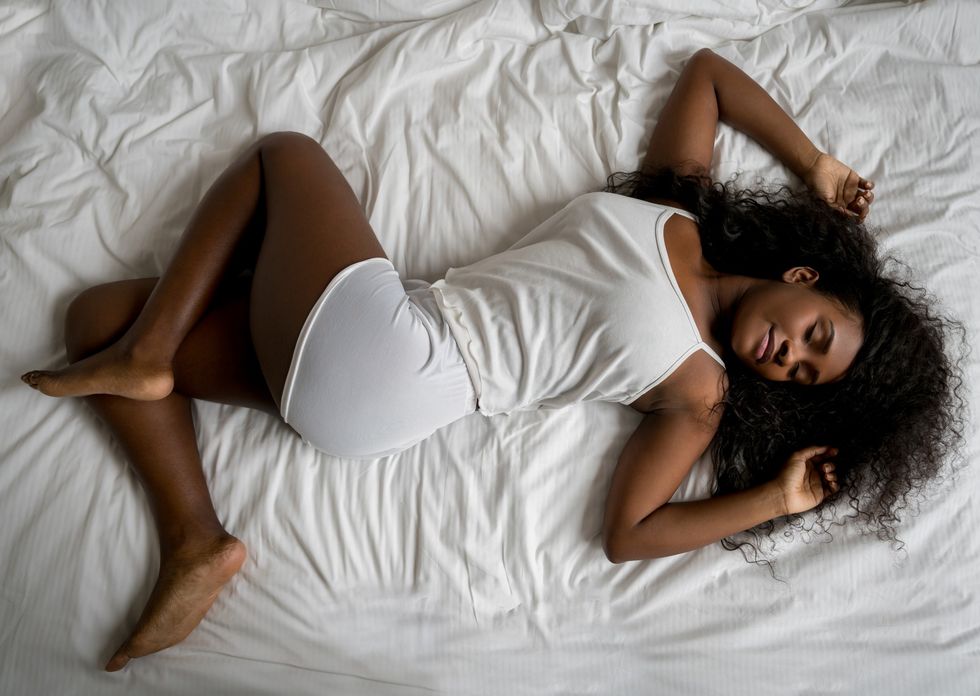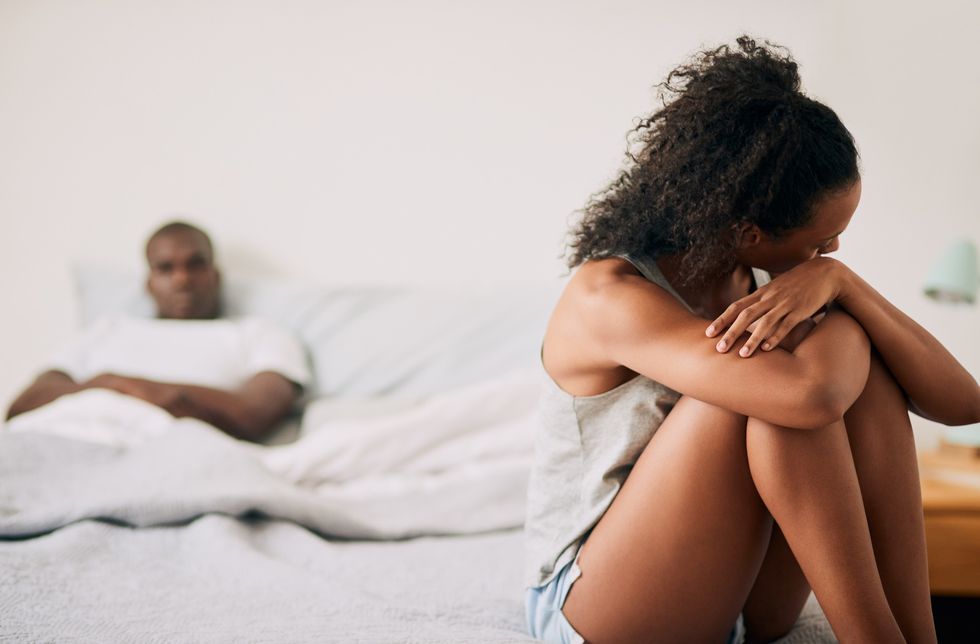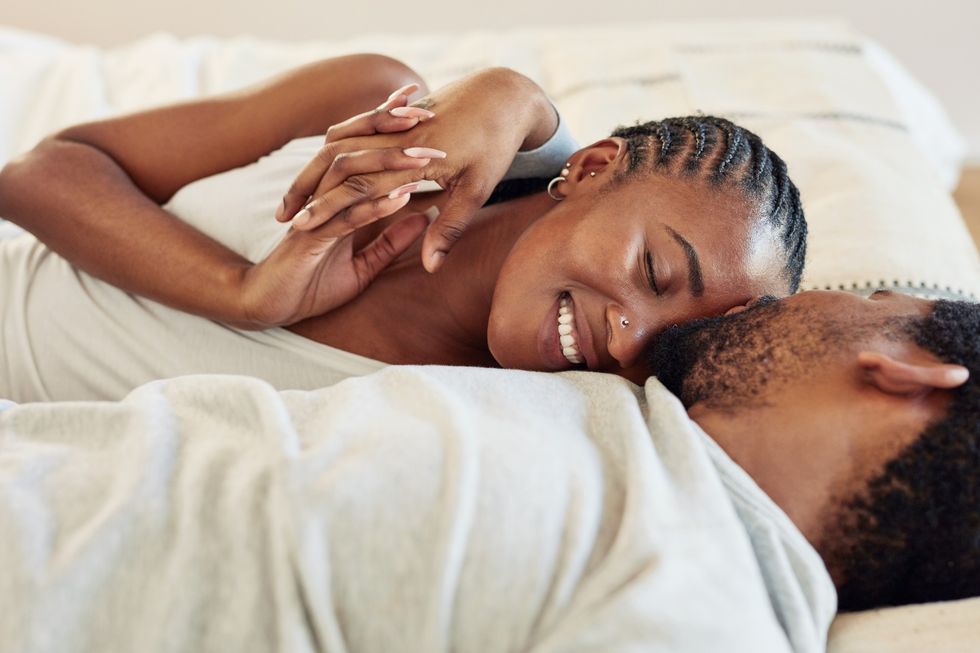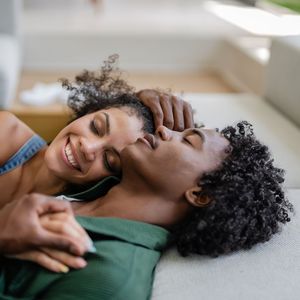
Embarking on a celibacy journey was a plot twist in my life that I never saw coming.
Sex was my comfort zone and that fact was something I didn’t come to terms with until my late twenties when I met a man who in a lot of ways allowed me to embody the fullness of myself fearlessly in ways I might have not realized at the time. I spent many years before that over-identifying with my sexual side because it was the part of me that I met with the least resistance and the part of me the people outside of me welcomed with open arms so I leaned into it. That coupled with my emotional unavailability at the time, made for an ease and a lack of emotional risk that allowed me to connect with others without getting in too deep.
I know now that it was why I felt comfortable talking openly about sex, be it to strangers, be it in situationships and no-strings-attached flings, be it on this very platform. While that’s not to say that my sexuality isn’t mine, it is to say there was an unhealthy element attached to it because of the way I didn’t realize I was using it at the time. In a strange way, I was using it as a shield.
I was masquerading as this evolved, fully healed version of myself with a healthy relationship with sex and my sexuality but in reality, I was lost and scared of being hurt so badly sometimes that I led with sex as a way to avoid true intimacy and being vulnerable. These are all things that I unpacked and discovered about myself last year during my shadow work sessions with my shadow work guide, Jordan Jeppe.
In her course offerings, Jeppe guides you through celibacy as a tool for deeper self-love. With reports of millennials and Gen-Zers engaging in less sex than previous generations, and even articles from our platform like, "More Women Are Taking The 'Girlfriend' Title & Exclusivity Off The Table In Dating — Here's Why," it's clear we are experiencing shifts in the romantic landscape for one reason or another where more focus is being placed on self.
Although my own celibacy journey is more seasonal and sporadic than year-round, I fell in love with unlocking a deeper understanding of myself and being able to start the work of confronting parts of myself that I otherwise may have not been honest about. I was met with the pain of my patterns but also the freedom that comes with allowing myself to be really seen. Celibacy for me was a vessel for healing, for self-love, but also for self-development.
Viewing celibacy as a tool to deepen that journey into self doesn't just point to society's increasing desire to opt out of hookup culture, but the collective desire to opt into choices that reflect wholeness versus lack. For more insight on how to use your season of sexlessness for better self-love, creating rules on your celibacy journey, and tips on how to discuss being celibate, Jordan Jeppe acts as our guide.
Elevating Self-Love on Your Celibacy Journey

andresr/Getty Images
The intentional reframing of self-love as a throughline in her celibacy course was a component Jeppe felt was necessary because of her own experiences of attracting partners who ultimately acted as a mirror of her lack of self-love at the time.
She explained, "When you love yourself, you don't settle in relationships that are half-assed, or just meet the bare minimum." Adding that when "You know you are worthy of more, you don't put yourself in situations to be treated poorly, over and over and over again, because you have the confidence and the self-worth to know that you don't deserve that."
A lot of us are led to forget ourselves because we are taught at a young age to believe our worthiness can be found in others. Our tendency to self-sacrifice leads us to prioritize others before ourselves and struggle to feel worthy outside of our doing for others. Jeppe assures that this conditioning takes away our power. "What we start doing is we start looking for people to complete us and we don’t think that we are worthy of being whole on our own."
For her, self-love and celibacy going hand in hand is necessary in order "to step into what we feel worthy of, and what we know that we want and where what we need to feel seen and heard and supported by another person."
Setting Boundaries on Your Celibacy Journey
Jeppe encourages those embarking on a celibacy journey to implement a set of rules to help them stay on track and act in alignment with their goals and intentions for being celibate. Needless to say, the earliest stages of the journey are a person's most vulnerable so cutting communication with temptation is essential. "No communication with exes, flings, or situationships" is the baseline. She adds, "No communication is important because that's a practice of setting a boundary, the practice of showing yourself that you are worthy. And it also cuts out temptation."
Being honest with yourself about your relationship with self-pleasure is also a must. "I think it's important to understand your relationship to self-pleasure, and what you get from it, whether it's serving you as a distraction, or to not feel things on a deeper level," she says. "If your program of pleasing yourself is to escape an uncomfortable emotion or to not think about what’s coming up, because as you know, a lot comes up in your celibacy journey, it’s understanding there might need to be a rule set there."
A rule like this could look like removing self-pleasure from your celibacy journey for at least eight weeks so you're not avoiding the work of addressing shadows or using it as an escape. Self-pleasure can be a very empowering tool on your journey. Ensure you use it wisely.
In line with that is Jeppe's hard no to dating at the beginning stages of being celibate, for at least five weeks. Her course is structured that way, where you spend the first few weeks getting clear on your shadows, honing in on your tendency to people please, be emotionally unavailable, or be codependent. Whether you are enrolled in her course or not, saying no to dating in the early stages of your sexless season allows for intentional time and focus spent on self.
After those suggested five weeks or whatever timeline you feel works best for you, you can open yourself up to what dating while celibate can look like. Jeppe supports dating during celibacy "because that’s how you take what you are learning and you practice it and that is necessary because you cannot have change without having awareness and action."
The beautiful thing about creating rules for your celibacy journey is that it's your journey, so your rules can be molded to adhere to your values, your relationships, or any number of things that factor into your guideline needs. There are different strokes for different folks and her baseline for effective celibacy guidelines might look different from yours. To start your own set of celibacy rules, Jeppe advises looking at past relationships not necessarily at your failures, but the things about the relationship(s) that didn't work well for you.
"If you are someone that really resisted saying no to a past partner, had murky boundaries, or just didn’t feel comfortable communicating what was going on for you, that’s going to be a red flag of your own boundary-setting," she explains.
"Before you begin celibacy, you have to be brutally honest with yourself. What wasn’t working in your past that almost hindered you, from your growth into your success? And looking at those things and making those things your rules. It could also be, you know, poor sexual boundaries. Again, that self-pleasure aspect, the no dating [rule]. [If you] catch yourself on dating apps all the time, swiping to swipe, getting hits of validation, [tell yourself] no dating apps."
Dating with Purpose: When and How to Tell Someone You're Dating You're Celibate
When to tell someone you're dating that you're celibate is a common question for people who choose to date while they're celibate. "I usually recommend doing it [on the] first or second date because you don't want to lead anyone on. You also don't want to lead yourself on. And, if you are committed through the timeline of celibacy, then this is just how you set yourself up for success," Jeppe explains. "Remember those guidelines. That looks like being honest."
Jeppe adds that you should try telling the person you're dating that you're celibate in person. An example of what that looks like can be as simple as:
“Hey, I like where this is going. I am enjoying how I am feeling with you. I want to let you know before things progress that I am celibate and that I am committed to my journey. If this is something that you would like to know more about, I am willing to share that with you. If this is not aligned with you, then that’s okay. I wish you well and it was lovely getting to know you.”
With the script above, Jeppe notes that by approaching the admittance this way, your self-worth is saying, "'I love myself enough to say and express understanding my values of what I want and what I am experiencing and how the other person reacts has nothing to do with me."
You can also opt to explicitly say, "I am celibate." In either instance, Jeppe says to "pay attention to how the other person responds. Do they support you or do they try to gaslight you? Or say, 'Oh, why would you do that?' Or, 'What are you actually getting from that?' Or try to talk you out of it? Red flags."
But, What if You ‘Break’ Your Celibacy and Regret It?

Adene Sanchez/Getty Images
As with anything, you might make an attempt to try something new, make a misstep, and fall. But falling doesn't mean failure. Breaking your celibacy is no different, and having feelings of regret or shame often come with it. "I broke my celibacy for a one-night stand five months in [my journey]," Jeppe recalls. "I am someone that has been there and I have also [gone] through the shame and the guilt that you put on yourself after doing it, and I have felt those feelings." She adds, "Now how I see breaking your celibacy is an opportunity."
If you have broken your celibacy streak recently and are experiencing those inevitable feelings of guilt, Jeppe wants you to remember how you choose to see breaking your celibacy is up to you. Jeppe believes it is an opportunity to understand what you were attracted to in that person and what that says about you. There was a reason you put yourself in that situation and Jeppe says it is a brave act of courage to take accountability in that way. Ask yourself, "What was I attracted to in that person? How did that person make me feel? When have I been allowing myself to feel that with myself?"
"Oftentimes, the reason why we break our celibacy is because the ego will come up. If you don't do the ego work, the ego's like, 'I deserve it, I was just feeling it, it felt really good.' And you are not paying attention to all that other red flags going on, right? Your ego is saying, 'I deserve it, I just spent 10 weeks celibate.' If you can’t recognize that the ego is showing up in those scenarios, then there’s an opportunity for you to understand, 'Oh, what was my ego actually wanting?' Because it’s usually rooted in some source of validation."
Jeppe says that if you break your celibacy, that’s okay. Allow yourself to release the shame and look for growth. In removing the shame you are owning your decisions even if it's a choice you wish you didn't make. How can you give yourself permission to grow beyond and choose differently in the future versus allowing the moment to define you?
"We are so rooted in shame. Everything we do is the part of shame," Jeppe shares. "Women being in pleasure have already [been] shamed enough. We don’t need to shame ourselves. We just need to understand what it was that we were attracted to, and why we did it." And then, let it go and begin again.
Beware of the Celibacy Crutch
Similar to the way sexual liberation acted as a shield for me to avoid vulnerability, for some, vulnerability can also be avoided underneath the veil of celibacy. "There's a flip side of celibacy, that it's almost as a crutch, that it's like, 'Oh, I am so good in my own energy and my own power that I don't even want to bring anyone in,'" Jeppe starts. While she applauds people standing in their power, she questions whether being so "good" alone is a defense that manifests out of fear.
To truly heal, you must also be able to allow others into the journey and experience of you. Dating can be a self-development tool. In fact, Jeppe often encourages the women she works with to start dating as a form of that practice. "How else are you going to practice your boundary setting? How else are you going to be triggered? Because I am sorry, that’s what’s going to happen," she says. "So, how can you see dating as a continuation of your self-development? And when you see it that way, you are also allowing yourself to go deeper in your own journey."
When to Stop Being Celibate

LumiNola/Getty Images
Your celibacy journey is created by your timeline. It could be years, or it could be six months or less. The ending point is specific to the person and is contingent upon how the person on the journey is feeling with their goals and intentions. When it comes to knowing when to stop being celibate, Jeppe describes it as an innate inner knowing of, "'I have done a lot of work on myself. I am feeling confident. And I am ready to put what I have learned up to the test.'" She also notes signs like no longer having bitterness towards the ex and "receiving and practicing your own form of validation" are how you know that you are ready to end celibacy towards the end.
The way you navigate your world looks like really allowing yourself to be seen "and allowing this new version of you to be appreciated," whether that be in the forms of your relationships, friendships, or your career. In that way, you are no longer seeking outside of yourself to validate yourself, you have already established that for yourself.
In a sense, your celibacy journey might not "stop" as it is intentional time that you spend with self and it occurs that way until it doesn't anymore, to resume when you need to begin again. Dating might indicate you're nearing the end of it, yes, but in another sense, the journey is always evolving. "The work that you are doing on yourself, you will continue evolving and growing when you meet other people, and they are going to reflect back aspects of yourself and you are gonna be like, 'Holy shit, I thought I worked on that through celibacy.' And it’s gonna show up and if it shows up, it’s okay, because now you have the tools compared to when you didn’t."
"I think it’s a lot of perception shifting, not seeing the end of celibacy having to be like the manifestation of your partner, while it can be, that’s also what has happened for me, but I would never sell it like that because I don’t want to give this false hope. What it is, is you continuing that journey of understanding what you need and what you want," Jeppe concludes.
"And so it’s like, 'Wow, what a beautiful next chapter to begin exploring yourself again.'"
Let’s make things inbox official! Sign up for the xoNecole newsletter for daily love, wellness, career, and exclusive content delivered straight to your inbox.
Featured image by FOTOGRAFIA INC./Getty Images
This Is How To Keep 'Holiday Season Stress' From Infecting Your Relationship
Hmph. Maybe it’s just me, but it seems like there is something really weird happening in the fall season air (because winter doesn’t officially begin until December 21) that cuddle season is in full swing while break-up season is as well. In fact, did you know that break-ups are so popular during the holiday season that December 11 is deemed Break-Up Day?
The reasons why relationships shift around this time vary; however, I did both roll my eyes and chuckle when I read that a very popular one is because it’s an easy way to get out of getting one’s significant other a Christmas present. SMDH.
Anyway, I personally think that the less shallow folks out here may contemplate calling things “quits” or they at least distance themselves a bit from their partner (and what I’m referring to is serious relationships) due to all of the stress and strain that oftentimes comes with the holidays whether it be financial, familial, due to their tight schedules or something else.
Listen, I would hate for you and your man to miss the fun and happiness of experiencing this time of year, all because you are so overwhelmed or irritated that you can’t really enjoy it. That’s why I have a few practical tips for how to avoid allowing the typical holiday season stress from INFECTING your relationship.
Manage Your Expectations
 Giphy
GiphyUnmanaged expectations. If there is a main reason why the holiday season tends to be so stress-filled for so many people, I’d bet good money that this is the cause. And when you’re in a long-term relationship, expectations can manifest themselves in all sorts of cryptic and/or unexpected ways. You might have relatives who assume that you are going to be with them for Thanksgiving or Christmas when you have other plans in mind. You might be thinking that you are going to spend one amount for presents while your man is thinking something totally different. When it comes to scheduling, your signals may be crossed.
And you know what? To all of these scenarios, this is where clear and consistent communication come in. Don’t assume anything. Don’t dictate anything either. From now until New Year’s, mutually decide to check in once a week, just to make sure that you are both on the same page as it relates to the holidays and what you both are thinking will come along with it. The less blindsided you both feel, the less stressed out you will be. Trust me on this.
Set (and Keep) a Budget
 Giphy
GiphyOkay, so I read that last year, 36 percent of Americans incurred some type of holiday-related debt. Hmph. Last year, there was still some sense of normalcy in this country, chile, so I can only imagine what finances are gonna look like over the next several weeks. That said, since I don’t know a lot of people who don’t find being broke stressful, make sure that you and your bae set a budget and then stick to it this year — no ifs, ands or buts.
Because really, y’all — it doesn’t make sense to deplete savings and/or max out credit cards for a few days of giggles only to be damn near losing your mind because you don’t know how to make ends meet come Dr. Martin Luther King, Jr. Day.
And by the way, this tip doesn’t just speak to things like food and gifts; I also mean travel. If it doesn’t make a ton of sense (or cents) to be all over the place this year — DON’T BE.
Keep Matthew 5:37 at the Forefront
 Giphy
GiphyIf off the top of your head, you don’t know what Matthew 5:37 says, no worries, here ya go: “But let your ‘Yes’ be ‘Yes,’ and your ‘No,’ ‘No.’ For whatever is more than these is from the evil one.” That verse right there? Oh, it’s a boundaries lifesaver! I say that because do you see “maybe” or “I’ll think about it” in there? Nope. LOL. It says that you should tell people “yes” or “no” and leave it at that — and that complements Anne Lamott’s quote, “’No’ is a complete sentence” impeccably well. Yeah, you’ve got to remember that anything beyond a yes or no to a request is privileged information; you don’t owe anyone details or an explanation.
Besides, if you are really honest with yourself, when someone asks you something and you give a “Umm, let me think about it” kind of reply, more times than not, you already know what your answer is going to be — so why not let you both off of the hook? Give your response. Commit to that. And let everyone (including yourself) get on with their lives and schedules.
I promise you that when it comes to those holiday parties, you are pissing more folks off by not RSVP’ing or doing so and not showing up than just saying, “Thank you but not this year” off the rip.
Remember That Your Personal Space Is Privilege Not a Right
 Giphy
GiphyA friend of mine recently bought a new house and invited me over to come see it. He’s a single man with no children, so as I was taking in all of the space that he had, especially as I walked through his finished basement, I joked about relatives coming to live with him. “Hell no” and “absolutely not” were pretty much his immediate responses as he went on to say that some folks even had the nerve to be offended when he told them that he had no intentions on taking DNA in.
Ain’t it wild how people think that your stuff is their right? And yes, that brings me to my next point. Your home is your sanctuary space. If you want to host folks this year — cool. If not, ALSO COOL. Please don’t let folks (family included) guilt you into how they want you to act or even into what they would do if the shoe was on the other foot. You are not them — and as one of my favorite quotes states, “If two people were exactly alike, one of them would be unnecessary.” (A man by the name Larry Dixon said that.)
Hell, my friends? They know that I am good for sending them random things that they need or even want all throughout the year. Coming over to hang out at my pace, though. Uh-uh. Chalk it up to being a card-carrying member of the ambivert club yet I like keeping my living space personal — and I sleep like a baby, each and every night, for feeling that way.
Always remember that your space, your time, your resources, your energy and shoot, yourself period (including your relationship), are all things that are your own. You get to choose how, when and why you want to share them. The holiday season is certainly no exception.
Cultivate Some “You Two Only” Traditions
 Giphy
GiphyIt’s not uncommon for some couples to hit me up after the holiday season to “detox.” Sometimes it’s due to the financial drama (and sometimes trauma) that they experienced. Sometimes it’s because they allowed their relatives (especially in-laws) to get more into their personal business than they should’ve. More than anything, though, it tends to be because they didn’t get enough quality time together and so ended up feeling “disconnected.”
Please don’t let that happen. Listen, I’m not even a holidays kind of woman and yet, I will absolutely sit myself down with some hot chocolate and chocolate chip cookies to enjoy a Hallmark holiday film or two. Aside from the fact that most of them are lighthearted and sweet, I also like that they usually focus on couples loving on each other amidst all of the holiday beauty and ambiance — which is something that all couples should set aside some time to do.
Maybe it’s a vacation. Maybe it’s a staycation. Or maybe it’s my personal favorite, A SEXCATION. Whether it’s for a few days, the weekend or even overnight — don’t you let the holidays go by without setting aside time for you and your man to celebrate one another. Don’t you dare (check out “Are You Ready To Have Some Very Merry 'Christmas Sex'?”).
GET. SOME. REST.
 Giphy
GiphyI once read that 8 out of 10 people get stressed out over the holidays and 3 out of 10 lose sleep during to it — and when you’re stress-filled and sleep-deprived, that can absolutely lead to hypersensitivity, making mountains out of molehills and even not being in the mood for sex.
Your relationship can’t afford to go through any of this, so definitely make sure to prioritize rest. I don’t care how unrealistic it might seem during this time, sleep should never be seen as a luxury; it will always and forever be a great necessity.
That said, try to get no less than six hours of shut-eye in (check out “6 Fascinating Ways Sex And Sleep Definitely Go Hand In Hand”) and even ask your bae to take a nap with you sometimes (check out “Wanna Have Some Next-Level Sex? Take A Nap, Sis.”). Not only will sleep help to restore your mind, body and spirit but, when it’s with your partner, it’s an act of intimacy that can make you both feel super connected, even in the midst of what might feel like chaos.
___
Holiday season stress is real. Still, never give it the permission or power to throw your relationship off. Put you and your man first and let the holidays be what they are gonna be, chile.
Let’s make things inbox official! Sign up for the xoNecole newsletter for love, wellness, career, and exclusive content delivered straight to your inbox.
Featured image by Shutterstock
Dreaming Of A White Christmas? These 7 Winter Wonderland Destinations Are Perfect For The Holidays
While most people opt for a tropical vacation during the winter months, there are still many people who want to fulfill their winter wonderland fantasies, which are more than likely centered on watching snow by the fireplace while sipping some hot cocoa.
With Thanksgiving vastly approaching and Christmas a little under a month away, there is still time to ditch the traditional Christmas home to visit family or friends.
Whether you’re looking to put a new stamp on your passport and keep things domestic with a destination in the States, xoNecole has you covered with a few hotspots for those itching to go somewhere cold (but with cozy vibes) this holiday season.
Aspen, Colorado
Our Christmas queen, Mariah Carey, has been taking an annual trip to this snowy destination since 1997, just three years after dropping the track that would make her the unofficial (but official to us) ambassador of the winter holiday.
Aside from being a key vacation spot for one of the culture’s greatest musicians, Aspen also offers travelers access to world-class skiing and snowboarding and four distinct mountains that provide the perfect backdrop for a winter vacation.
Whistler, British Columbia, Canada
Home to the largest ski resort in North America, Whistler Blackcomb, this destination is located in the Coast Mountain Range and is about 75 miles north of Vancouver.
From luxury spas like Scandinave Spa Whistler to Olympic Park, this is another top winter vacation spot that offers a unique experience for people who love snow and the thrill of a good adventure.
Western Massachusetts
Dubbed the place for a magical holiday escape, Springfield, Massachusetts, blends the warmth of small-town charm with unforgettable experiences like Grinchmas at Springfield Museums, Winterlights at Naumkeag in Stockbridge, Historic Deerfield’s Winter Frolic, and many others.
This destination offers something for all ages, and it’s close to home, making it all the more reason to place on your radar for a winter getaway.
Rovaniemi, Finland
If you want to really get into the Christmas spirit, this just may be the place for you. As the official home to Saint Nick himself, Rovaniemi, Finland offers reindeer sleigh rides, the opportunity to stay in a glass igloo, as well as an opportunity to experience the Santa Claus Village.
Lake Tahoe, California/Nevada
Who says that visits to the lake house are only reserved for summer vacation? A winter trip to Lake Tahoe is equipped with stunning lake views and top-notch ski resorts, including Heavenly and Northstar.
Chamonix, France
Sitting at the base of Mont Blanc, Chamonix, France, is known for its skiing and mountaineering. This destination is home to the Aiguille du Midi cable car, the charming Alpine village, and is also close to various other European ski destinations.
Northeastern Pennsylvania
This area of the U.S. state is home to the Poconos Mountains, whose renowned ski resorts include Camelback Mountain, Blue Mountain, and Jack Frost Big Boulder. Whether you’re a ski expert, a beginner, or just there for the vibes, this destination makes for a winter vacation that balances fun adventures and cozy getaways. Additionally, Pennsylvania is home to the Christmas Tree Capital of the world.
Feature image by Shutterstock
Originally published on November 23, 2024









